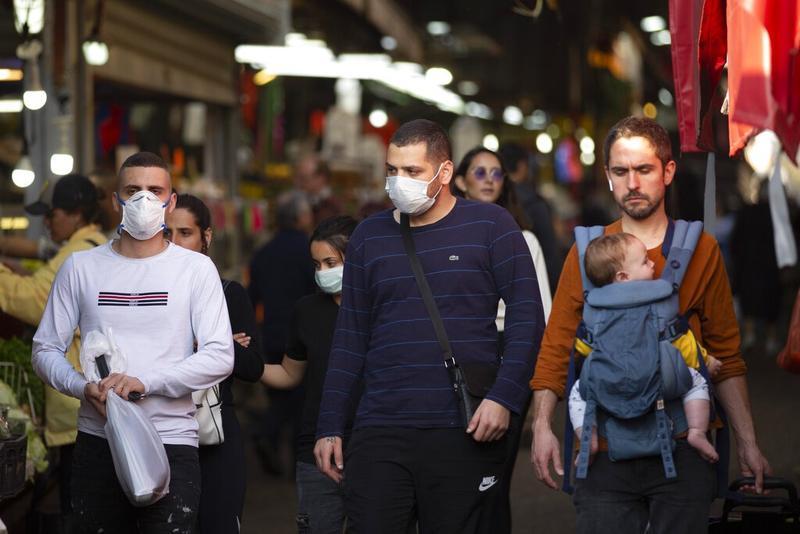 People wear face masks as they shop at a food market in Tel Aviv, Israel, March 16, 2020. (ODED BALILTY / AP)
People wear face masks as they shop at a food market in Tel Aviv, Israel, March 16, 2020. (ODED BALILTY / AP)
Israel approved the use of tracking technology developed to combat terrorism to retrace the movements of coronavirus patients and people they’ve encountered, a controversial step in the country’s fight against the fast-spreading illness.
Critics say the use of this location technology, so far limited to 30 days, constitutes a dangerous precedent and an invasion of Israeli citizens’ privacy.
Israel’s internal security agency, commonly known by its Hebrew acronym Shin Bet, will monitor the cellphones of coronavirus patients to track their movements
The cabinet debated the use of this technology for six hours, placing “strict oversight” over the tools “to ensure that they would not be abused,” Prime Minister Benjamin Netanyahu said Monday night.
“These means will greatly assist us in locating patients and thereby stop the spread of the virus,” Netanyahu said.
READ MORE: Israel's president tasks Gantz with forming government
Israel’s internal security agency, commonly known by its Hebrew acronym Shin Bet, will monitor the cellphones of coronavirus patients to track their movements and will send text messages to people who came in contact with them to go into quarantine or be tested for the illness. The agency will have the cellular data of all Israeli citizens.
It’s long been known that Israel has collected data from mobile phone companies to track people for counterterrorism purposes. But the technology whose use was approved on Monday can also sift through masses of data to pinpoint not only people who are being tracked, but also those they may have come in contact with, the Ynet website said.
ALSO READ: Netanyahu election lead shrinks, another Israel vote looming
Lawmakers sworn in at the seating of parliament on Monday did not debate the plan, which was approved late Monday. It was authorized at a time when the prime minister -- still operating in a caretaker capacity after three inconclusive elections -- and his allies are taking unilateral steps in response to the virus’s spread, including restrictions on court activities that led to the postponement of Netanyahu’s corruption trial, due to begin on March 17.
Sensitive Matter
The government asked the Shin Bet to apply the technology after concluding that other authorities lacked the capabilities to track the virus’s spread, the organization’s head, Nadav Argaman, said in a statement on Tuesday.
“The sensitivity of the matter is very clear to me,” Argaman said. Only a “very limited group” of agents will have access to the data and it will not be stored in the agency’s database, he added. Until now, Israeli authorities have relied on the accounts of patients about their whereabouts.
The Israeli government asked the Shin Bet to apply the technology after concluding that other authorities lacked the capabilities to track the virus’s spread, the organization’s head, Nadav Argaman, said in a statement on Tuesday
That unusual and unnecessary step of bringing in the Shin Bet sets Israel “on a slippery slope,” tweeted Tehilla Shwartz Altshuler, head of the democracy in the information age program at the Israel Democracy Institute, a research center in Jerusalem. “You can find this data in other ways.”
Netanyahu also announced further economic restrictions on Monday as the number of coronavirus infections in Israel rises steadily, to 304 at the latest count, with no fatalities. The measures will last until the end of the Passover holiday in mid-April.
The government plans to slash the number of public sector employees in offices, furloughing many. Private businesses have been instructed to cut the number of employees in their workplaces by 70%. Essential services like supermarkets, pharmacies and banks will continue to operate as normal.
“I am not declaring a general closure,” Netanyahu said. “I very much hope that we will not come to that.”
Restrictions on Palestinians entering the country to work will be tightened beginning on Wednesday, Israel’s Defense Ministry said in a statement. Employment in Israel is a major contributor to the West Bank economy, with about 100,000 Palestinians working in Israel and Jewish West Bank settlements.


